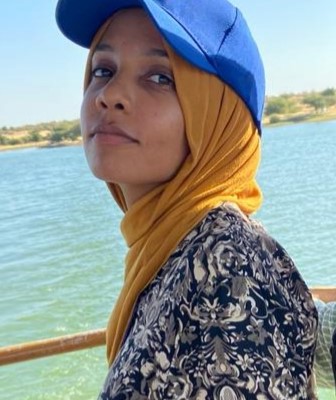THE DUTCH RELIEF ALLIANCE
This blog is written by Afnan Salah, field coordinator assistant from the Sudan Joint Response. The Dutch Relief Alliance is, through the Sudan Joint Response, providing first-line emergency WASH interventions that focus on (among others) hygiene promotion and water supply for refugees that newly arrive in Kassala reception center.

As a field coordinator for the Sudan Joint Response, I have been observing how different NGOs can adapt and harmonize their efforts in an efficient way when it comes to emergency response. I have seen in my home country Sudan that cooperation in emergencies can bring out the best of people and organizations. This thought popped up in my head as we were landing in Kassala Airport, in a plane with NGO staff deployed to support the Ethiopia refugee response on the Sudanese border. I am here to support the Ethiopia refugee response of the Sudan Joint Response.
Next stop: Hamdayet reception centre. Hamdayet is a city approximately 5 hours by car from Kassala. It is located by the Atbara/Elseteet river that naturally draws a border between Sudan and Ethiopia, specifically the Tigray region. Currently more than 40.000 Ethiopian refugees have crossed the border with Sudan, seeking refuge from the conflict in Tigray. The refugees arrive in a reception centre at the border where they are registered and can temporarily stay before they can go to a refugee camp. We arrive at the reception centre in the morning. The sun is extremely hot and shelter is limited. People gather at the walls of the old building that is used as the management center of the site to find some shade. Women wrap their kids to their backs and cover their heads, while they are cooking or washing clothes. Children fetch water from the river or take care of their younger siblings. Although I am very overwhelmed entering the camp – for it is always sad to see people flee their homes because of war – once I step in and hear the laughter of children I get determined and strong as if this is the sound of hope! We start our day at the Commission for Refugees Sudan (COR) and the UN Refugee Agency (UNHCR)-office to hear about updates, gaps, challenges and to share information about our intervention. We also discuss what the most suitable way is to proceed immediately with the distribution of emergency aid items and explore opportunities to coordinate with other actors.
As I step out, a group of young girls approach me to ask for the dignity kits that were distributed by Plan International under the Sudan Joint Response a few days ago. I am proud to be a young female humanitarian worker, because it makes it easier for young girls to talk to me not only about their needs, but also about their feelings and experiences in the camp. One of these girls is Salam. Her name is both the Tigrigna and Arabic word for “peace”. She is 19 years old and has arrived in the Hamdayet reception centre on the 21st of November. Since then, she has been looking for her family. Every day she stands in Hamdayet town with a determined look on her face, stopping people and asking if anyone has seen her family. Salam fled her home when she heard the bombing. She tells me: “I left my father and mother and I ran, I thought I might find them here, but they are not here”. She explains that it is difficult being a girl in the reception centre. There is no privacy and she has not been able to take a bath since she arrived. Sometimes people go to the river to wash their clothes, fetch water or take a bath. But women don’t feel safe to do so in an open area. The translator mentions that she has been refusing to eat until she finds her family. I accompanied Salam to the UNHCR protection desk for people who are at risk, where Salam is registered and referred for assistance.
A little bit later, when I am sitting beside the registration tent, I notice an Ethiopian man who is organizing the lines, prioritizing people with special needs (such as women with babies or pregnant women) and people with disabilities. He is making jokes to make people laugh, entertaining children and sharing information on the registration process. A bit later, he joins me in the shade to drink some water. He smiles at me and teaches me how to say ‘hello’ in Tigrigna. His name is Hargos and he explains that he came as a refugee to the centre and is now active as a volunteer. He was at the market when the bombing began and he had no choice but to run with others towards the farm fields, hoping that when the fire seized he could bring his wife and his 9-year old son to safety. Unfortunately, when he went home, he found his house burnt and no one left in his neighborhood. He fled to Sudan to seek safety and decided to volunteer in the camp. “I volunteer to support women and children during this difficult time hoping that someone, somewhere, is doing the same for my wife and my son, who I think about all the time”. It occurred to me that this is exactly what it means to be a humanitarian worker: to provide necessary life-saving aid the way you would want it to be provided to your own loved ones!
Today, as over 40.000 refugees are crossing the border, I am doing my best to memorize each face and to remember their dreams and hopes of being safe and live with dignity.
THE DUTCH RELIEF ALLIANCE
CARE Nederland (chair)
Parkstraat 19
2514 JD Den Haag
The Netherlands
E: office@dutchrelief.org